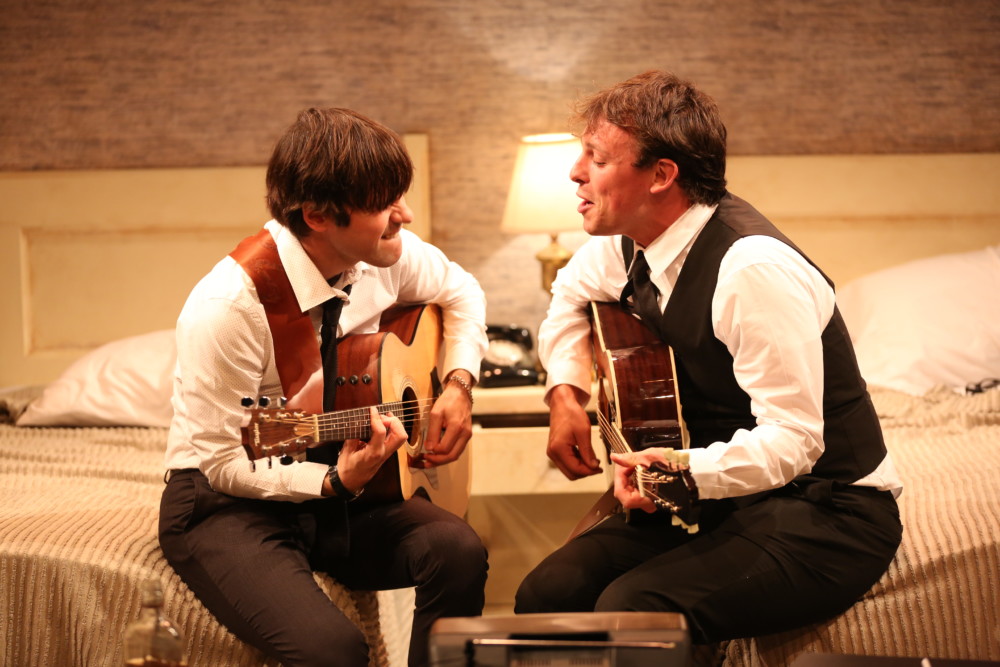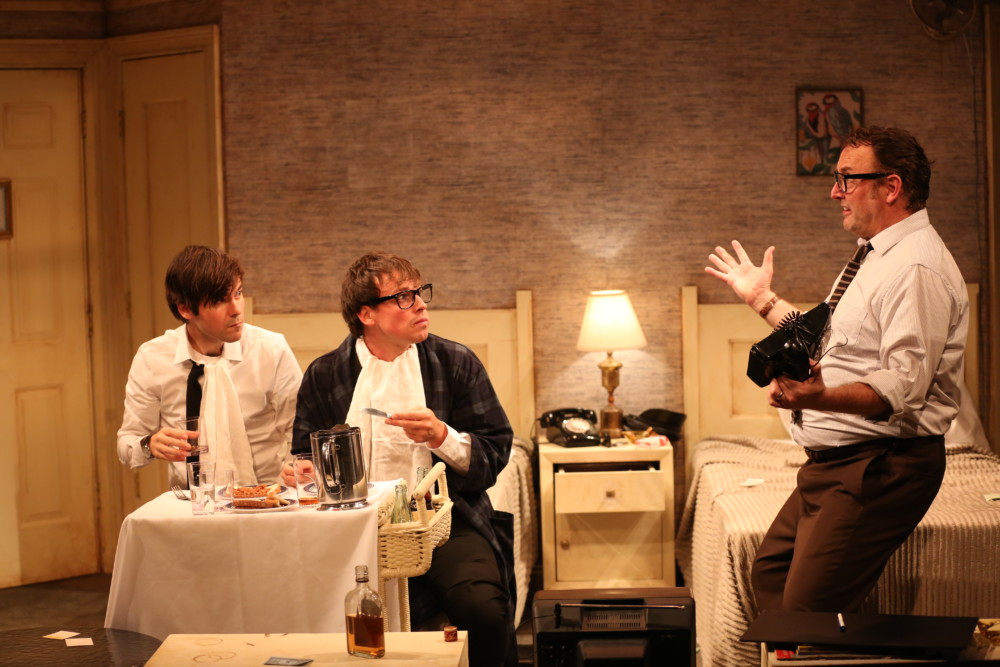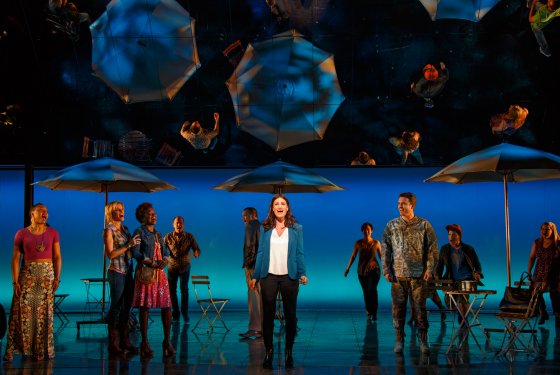By Samuel L. Leiter
Even today, nearly 50 years after they broke up, the Beatles (a heated debate rages over whether it should be The or the Beatles) keep inspiring others to capitalize on their magic. This summer we had the movie Yesterday, a fantasy about what would happen if the band’s music was forgotten. Now we have Bob Stevens’s Only Yesterday, a disappointingly doleful dramedy that turns us into flies on the wall watching Paul McCartney (Tommy Crawford) and John Lennon (Christopher Sears) stranded in a Key West motel room on September 9, 1964.
The play’s external details, including the date, are accurate (you don’t want to mess with Beatlemaniacs). At that moment, the Beatles’ popularity was nothing short of stratospheric, their appearance on Ed Sullivan’s TV show having drawn over 70 million viewers. Just before they were scheduled to appear in Jacksonville, however, as part of an extensive national tour, they were forced by Hurricane Dora to hunker down in a shabby motel.
With George and Ringo housed elsewhere, John and Paul, wearing black suits and skinny black ties (costumes: Allison Crutchfield), have to share the place, which designer Michael Ganio has set against a background listing touring destinations and dates. Hurricane effects, impressively created by lighting designer Dan Kotlowitz and sound designer Jane Shaw, periodically interrupt to remind us of the situation.
Sir Paul himself verifies the experience via a radio clip that opens and closes the play, during which he recalls the night as “an important emotional landmark” in his relationship with John. They talked the night away, probably speaking about the deaths of their mothers, who happened to pass within six months of each other. That circumstance is the impetus for the play, in which Stevens imagines not only what their conversation might have entailed but also explores how the boys (Paul was 22, John 23), who each suffered childhood hardships—Paul’s economic, John’s familial—were handling their sudden ascent to international adulation.
Just this week, Michael Schulman published a terrific report on fandom in The New Yorker, noting that Beatlemania “further crystallized the image of the screaming female fan.” And screaming girls there are in Only Yesterday, their clamor heard outside whenever the Beatles’ road manager (Christopher Flockton) opens the door. There’s even a 13-year-old girl named Shirley (Olivia Swayze, unseen) who, after getting stuck in the room’s air vent while attempting to be near her idols, not only converses with them, but is serenaded.
For the most part, though, Only Yesterday is an often-lethargic dialogue between the reticent Paul and the outspoken, crabby John, displaying the pair as innocent juvenile frenemies and rivals (they have a pillow fight and play Monopoly, during which John steals Paul’s play money).
As the night wears on, with several moments during which we hear Fidel Castro on the TV speaking in Spanish, numerous fact-based references drive the chitchat along. We thus hear Paul and John insist that they won’t perform in Jacksonville if their concert is racially segregated; how they’re struggling to write new material, how inspired they were by white artists, like Elvis Presley (John even does some Elvis shtick), and black artists like Chuck Berry; and how impressed John is by Bob Dylan, making him want to abandon love songs for more meaningful ones. John and Paul also reminiscence about their childhoods, leading to the play’s emotional foundation, their mothers.
There’s really not much of a play in this 70-minute exercise, uninspiringly directed by Carol Dunne, whose chief interest is putting us in the private presence of Lennon and McCartney at the outset of their legendary careers. The sentimental value of their recollections—which gave birth to “Let It Be” (“Mother Mary” is Paul’s mom), whose recording is heard at the curtain—is meager material for dramatic development.
Even the musical moments—mostly bite-sized pieces rather than complete numbers—are unmemorable. The guys, playing acoustic guitars, offer covers of Chuck Berry, Elvis, and the Everly Brothers, but avoid actual Beatles songs (probably because of rights). John even croons a lugubrious “Danny Boy.” With neither Crawford nor Sears singing nearly well enough to make us forget the originals, the effect is disconcerting.
Even if this nostalgic tedium were more compellingly dramatized, it would still be burdened with actors who lack the physical, musical, and charismatic qualities of those they’re portraying. Neither wears a wig to suggest the famous Beatle moptops, but their natural hair is insufficient for the task. Crawford manages to be a bit closer to the look but Sears can do little more than muss his God-given crop. Just as off-putting are the actors’ shaky accents.
I’ve admired the Beatles since seeing them on that 1964 Ed Sullivan show, but come nowhere near worshipping them the way my Beatlemaniac son does. If you, too, worship the Beatles, my advice regarding Only Yesterday is to simply let it be.
Photos: Carol Rosegg
Produced by Northern Stage
59E59 Theaters/Theater B 59 E. 59th St., NYC
Through September 29, run time 70 minutes
























